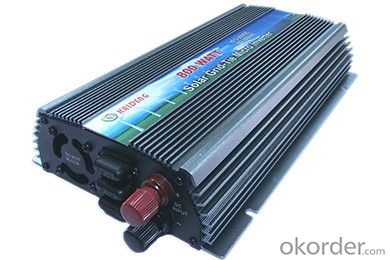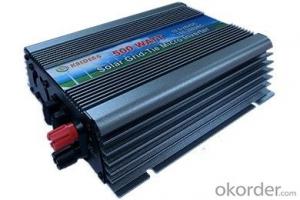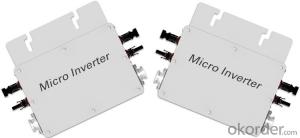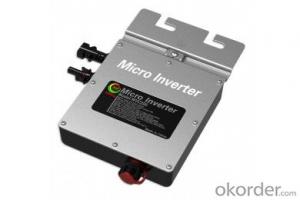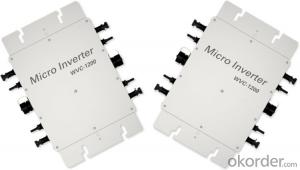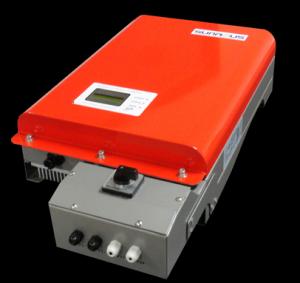Go Solar Inverter - KD-GTI800W Series Micro Inverter, Hot Sales
- Loading Port:
- China main port
- Payment Terms:
- TT OR LC
- Min Order Qty:
- 1000 pc
- Supply Capability:
- 100000 pc/month
OKorder Service Pledge
OKorder Financial Service
You Might Also Like
Structure
The transition from a centralized to a distributed inverter optimizes energy collection.
The converter module integrated into the solar panels can reduce installation costs.
Soft switch technology to replace hard-switching technology can improve efficiency and reduce heat dissipation.
From cottage industry to mass production, standardized design (hardware and software) to improve reliability and reduce costs.
Using a special capacitor (due to the high failure rate). Design requires a higher voltage to reduce the current, we use a special electrolytic capacitors.
The converter can be connected to the grid to eliminate the need for many battery applications. The high price of batteries, require maintenance, life expectancy is shorter.
Work required micro-inverter power increasingly smaller (only a few hundred watts), which can reduce the internal temperature and improve reliability.
Micro-inverter solar inverter system needs to deal with a lot of a particular power level, in order to increase production, thereby reducing costs.
DC input voltage range:10.5-28VDC
AC output voltage range:80-160VAC/180-260VAC
AC output power :750Wp
AC frequency range:50Hz/60Hz
G.W.:2.4KG
Size:394mm*209mm*117mm
KD-GTI800W Series Using IP67 waterproof streamline design, Can effectively prevent rainwater on the surface erosion, Built-in high-performance Maximum Power Point Tracking(MPPT)Function,Better able to track changes in the solar luminosity and control different output power, Effectively capture and collect sunlight. AC electric power transmission using the reverse transmission technology, Is one of our patented technology, The inverter output power can provide load priority use, Extra electricity to the grid, Efficient use of the inverter to the power emitted, Electricity transmission rate of up to 99%.
Features
Pure Sine Wave Output;
High performance Maximum Power Point Tracking(MPPT);
Power Automatically Locked(APL);
Reverse power transmission;
High-Frequency High Conversion Rate;
Anti-Islanding Protect;
Input /output is fully isolated to protect the electrical safety;
Multiple parallel stacking;
The Leading Patent Technology;
IP65 WaterProof;
Flexible Installation;
Simplify maintenance (user serviceable)
High Efficiency & Best Cost-Effectiveness
Images
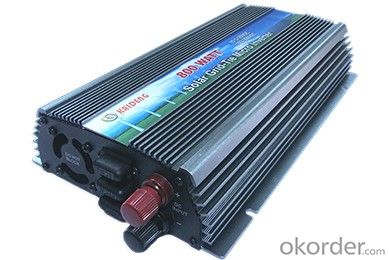

Specification
Grid-series models | 300W | 500W | 800W | 1000W |
Recommend use solar panels | 420Wp | 620Wp | 1050Wp | 1250Wp |
DC Maximum Input Power | 400W | 600W | 900W | 1200W |
DC maximum voltage | VpvDC30.2VDC | |||
DC voltage range | Vpv 10.5V~28VDC | |||
Maximum output power factor | 99% | |||
Maximum input current | 20A | 30A | 45A | 65A |
AC output power | 300W | 500W | 800W | 1000W |
AC maximum output power | 300W | 500W | 800W | 1000W |
Anti-voltage protection | Fuse | |||
AC standard voltage range | 90~160VAC/190~262VAC | |||
AC frequency range | 55Hz~63Hz/ 45Hz-53Hz | |||
THDI | <5% | |||
Phase | <1% | |||
Islanding protection | VAC;f AC | |||
Output short circuit protection | Current-limiting | |||
Show | LED | |||
Installation | Wall hanging | |||
Cooling | Fan | |||
Standby Power | <2W | |||
Night Power | <1W | |||
Ambient temperature range | -25 °C~60°C | |||
Humidity | 0~99%(Indoor Type Design) | |||
Waterproof | Indoor Type Design | |||
Electromagnetic Compatibility | EN50081.part1 EN50082.part1 | |||
Power System Disturbance | EN61000-3-2 EN60950-1 | |||
Network test | DIN VDE 1026 | |||
Certificate | CE | |||
FAQ
Can we visit your factory?
Surely, I will arrange the trip basing on your business schedule.
Can you do OEM for us?
Yes, we can.
How do you pack your products?
We have rich experience on how to pack the panels to make sure the safety on shipment when it arrives at the destination.
Can you help us install the module if we cooperate with you?
We haven’t entered into installation sector, but we have the plan in near future.
- Q: Is it possible to monitor the performance of a solar inverter remotely?
- Yes, it is possible to monitor the performance of a solar inverter remotely. Many modern solar inverters come with built-in monitoring capabilities that allow users to track and analyze the system's performance from a remote location. This can be done through dedicated monitoring portals or mobile applications which provide real-time data on energy production, system efficiency, and any potential issues or faults. Remote monitoring enables users to optimize the performance of their solar inverter, identify any maintenance or operational requirements, and ensure the system is operating at its maximum potential.
- Q: Are there any noise emissions from a solar inverter?
- Yes, solar inverters generally produce some level of noise emissions. However, the noise generated by modern solar inverters is typically very low and often negligible. The noise is mainly caused by the cooling fans within the inverter, which are designed to keep the device cool during operation. Nonetheless, the noise level is usually not bothersome and should not significantly impact the surrounding environment or living spaces.
- Q: Can a solar inverter work without batteries?
- Yes, a solar inverter can work without batteries. In a grid-tied solar system, the solar inverter converts the DC power from the solar panels into AC power that can be used in the household or fed back into the grid. Batteries are not necessary as the system relies on the grid for power supply during periods of low or no sunlight.
- Q: How does a solar inverter handle grid disturbances (voltage sags, swells, flickers)?
- A solar inverter handles grid disturbances such as voltage sags, swells, and flickers by constantly monitoring the grid's voltage and frequency. When a disturbance occurs, the inverter utilizes its internal control mechanisms to adjust the solar power output accordingly. It can compensate for voltage sags by injecting additional power into the grid, and it can reduce power output during voltage swells to prevent overloading. Additionally, the inverter's control algorithms help minimize flickering by maintaining a stable and consistent power supply to the grid.
- Q: Can a solar inverter be used with different battery chemistries?
- Yes, a solar inverter can be used with different battery chemistries as long as the voltage and capacity of the batteries are compatible with the inverter's specifications. However, it's important to note that different battery chemistries may have varying charging and discharging characteristics, so it is advisable to consult the manufacturer's guidelines to ensure optimal performance and safety.
- Q: What are the advantages of using a solar inverter?
- There are several advantages of using a solar inverter. Firstly, solar inverters convert the direct current (DC) generated by solar panels into alternating current (AC), which is the type of electricity used in most homes and businesses. This allows for the seamless integration of solar power into the existing electrical grid. Secondly, solar inverters optimize the performance of solar panels by constantly monitoring and adjusting the voltage and current levels. This ensures that the panels are operating at their maximum power output, resulting in higher energy efficiency and increased electricity production. Moreover, solar inverters enable net metering, which allows excess solar energy to be fed back into the grid, effectively spinning the electricity meter backward. This can lead to significant savings on electricity bills or even generate income through feed-in tariffs. Additionally, solar inverters offer advanced monitoring capabilities, allowing homeowners and system operators to track the energy production and performance of their solar systems in real-time. This data enables better system maintenance, troubleshooting, and optimization. Lastly, solar inverters contribute to a cleaner and more sustainable energy future by reducing dependence on fossil fuels and minimizing greenhouse gas emissions. They play a crucial role in harnessing the power of the sun to generate clean, renewable energy.
- Q: Can a solar inverter be connected to a backup battery system?
- Yes, a solar inverter can be connected to a backup battery system. This allows the excess solar energy generated during the day to be stored in the backup battery system for later use during times when there is no sunlight available, such as at night or during power outages.
- Q: Can a solar inverter be used in a mobile or portable solar power system?
- Yes, a solar inverter can be used in a mobile or portable solar power system. Solar inverters are designed to convert the DC (direct current) electricity generated by solar panels into AC (alternating current) electricity that can be used to power various devices. In a mobile or portable solar power system, the solar inverter plays a crucial role in converting the energy collected by the solar panels into a usable form for powering appliances or charging batteries.
- Q: What is the role of a solar inverter in a grid-tied system?
- The role of a solar inverter in a grid-tied system is to convert the direct current (DC) electricity generated by the solar panels into alternating current (AC) electricity that is compatible with the electrical grid. It also ensures the synchronization and stability of the solar power system with the grid, allowing excess energy to be fed back into the grid and enabling the system to draw power from the grid when needed.
- Q: Can a solar inverter be connected to a home automation system?
- Yes, a solar inverter can be connected to a home automation system. This integration allows homeowners to monitor and control their solar power generation and consumption remotely through their home automation system. It provides real-time data on energy production, allows for scheduling and optimizing energy usage, and enables the automation of various appliances and devices based on solar power availability.
Send your message to us
Go Solar Inverter - KD-GTI800W Series Micro Inverter, Hot Sales
- Loading Port:
- China main port
- Payment Terms:
- TT OR LC
- Min Order Qty:
- 1000 pc
- Supply Capability:
- 100000 pc/month
OKorder Service Pledge
OKorder Financial Service
Similar products
Hot products
Hot Searches
Related keywords



